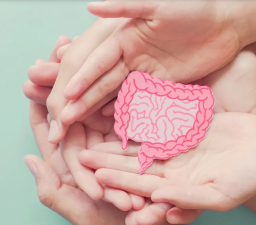Over the past few decades, scientists have discovered that there is a close connection between intestinal health and our psychological state, and that intestinal microbiota plays an important role in our emotions and cognitive functions. More and more studies have shown that the intestine is not just a place to digest food, but is also called the "second brain", which directly affects our psychological state through a channel called the "gut-brain axis".

Over the past few decades, scientists have discovered that there is a close connection between intestinal health and our psychological state, and that intestinal microbiota plays an important role in our emotions and cognitive functions. More and more studies have shown that the intestine is not just a place to digest food, but is also called the "second brain", which directly affects our psychological state through a channel called the "gut-brain axis".
Although existing studies have confirmed the connection between intestinal health and the brain and psychology, there are still many unknown areas waiting to be explored. Future research may pay more attention to each person's unique intestinal microbiome to help develop personalized diet and conditioning plans. In addition, this process also requires large-scale clinical trials and interdisciplinary collaboration to combine biology, psychology and nutrition to help us understand this complex relationship more comprehensively.

The role of intestinal microorganisms
The intestinal microbiome is composed of trillions of bacteria, viruses and fungi, which play a vital role in digestion, metabolism and immunity. More importantly, these microorganisms are also able to produce a variety of neurotransmitters and bioactive substances, which in turn affect brain function.
For example, about 90% of serotonin, a neurotransmitter closely related to mood regulation, is synthesized in the intestine. Gut microbes can also affect immune responses and inflammation levels by producing metabolites such as short-chain fatty acids.
Gut-brain axis
The "gut-brain axis" is a research area that has received much attention in recent years. The gut-brain axis refers to a two-way communication network between the gut and the central nervous system. This network transmits information through the nervous system (especially the vagus nerve), the endocrine system, and the immune system.
Changes in the gut microbiome can affect brain function and psychological state through these pathways. This complex interaction makes gut health an important factor in maintaining mental health.
The impact of gut flora imbalance
Studies have shown that there is an important association between gut flora imbalance and psychological problems such as anxiety and depression. Some studies have found that the gut microbial composition of patients with depression is significantly different from that of healthy individuals.
In particular, the reduction of certain beneficial bacteria (such as bifidobacteria and lactic acid bacteria) is associated with the aggravation of depression and anxiety symptoms. This suggests that maintaining gut health may be an important strategy for preventing and treating these mental illnesses.
Interventions to improve gut health
Through dietary adjustments, probiotic supplementation, and lifestyle improvements, it is expected that the balance of gut microbes can be restored, thereby alleviating anxiety and depression symptoms.
For example, a fiber-rich diet helps promote the growth of beneficial bacteria, while fermented foods (such as yogurt, kimchi, etc.) directly provide active probiotics.
Some clinical trials have shown that supplementing with probiotics can significantly reduce anxiety and depression and improve psychological state.
The association between intestinal health and cognitive ability
Studies have found that intestinal health has an important impact on cognitive function. Healthy intestinal flora is associated with better memory and learning ability. Experiments have shown that supplementing with specific probiotics can improve learning and memory ability, which may be related to the promotion of neuroplasticity by intestinal microorganisms.
The relationship between inflammation and cognitive function
The effect of intestinal health on cognitive function is also closely related to the level of systemic inflammation. Intestinal flora imbalance may lead to increased inflammatory response, and chronic inflammation is considered to be an important factor in cognitive decline (such as Alzheimer's disease). Therefore, maintaining intestinal health can protect cognitive function by reducing inflammatory response.
Production of neurotransmitters
Intestinal microorganisms can produce a variety of neurotransmitters, such as serotonin, GABA (γ-aminobutyric acid), etc., which play an important role in mood regulation.
Serotonin not only helps to improve mood, but also participates in the regulation of sleep and appetite. GABA has a calming and anti-anxiety effect. The balance of intestinal microorganisms can affect the synthesis of these neurotransmitters, thereby affecting the emotional state.
Regulating stress response
Gut microorganisms also affect psychological state by regulating the body's stress response. When individuals are under stress, the intestinal microbiome can affect hormone levels in the body, especially cortisol (stress hormone), by releasing neurotransmitters and cytokines.
Some studies have found that people with good intestinal health show lower cortisol levels and better emotional regulation when dealing with stress. This suggests that optimizing the intestinal microbiome may help improve individuals' ability to cope with stress in daily life, thereby protecting mental health.
Lifestyle influence
Lifestyle also has a significant impact on intestinal health and emotional regulation. Regular exercise, adequate sleep and a healthy diet have all been shown to improve the diversity of intestinal microorganisms, thereby promoting mental health.
Exercise not only stimulates changes in intestinal microorganisms, but also releases "happy hormones" such as endorphins to improve emotional state. Insufficient sleep may lead to intestinal flora imbalance, which in turn affects mood and cognitive function.
Importance of nutrients
Diet is an important factor affecting the intestinal microbiota. Fiber-rich foods, such as whole grains, fruits and vegetables, can promote the growth of beneficial bacteria and increase the production of short-chain fatty acids, thereby improving the intestinal environment. In addition, nutrients such as Omega-3 fatty acids, vitamin D and antioxidants also have a positive effect on intestinal health and psychological state.
Avoid a poor diet
On the contrary, some unhealthy eating habits, such as high sugar, high fat and processed food intake, may lead to intestinal flora imbalance, thereby increasing the risk of anxiety and depression.
A high-sugar diet may lead to increased inflammatory response, thereby affecting mental health. Studies have shown that long-term high-sugar diet is significantly associated with depressive symptoms.
The role of probiotics and prebiotics
The application of probiotics and prebiotics has gradually gained attention in improving intestinal health. Probiotics refer to active microorganisms that are beneficial to health, while prebiotics are fermentable dietary fibers that promote the growth of probiotics.
Studies have shown that regular intake of probiotics and prebiotics can not only improve the diversity of intestinal flora, but also significantly improve anxiety and depression symptoms.
Intestinal health
Promote digestion: Essential oils of rhizomes and seeds, such as dill, sweet fennel, coriander, ginger, turmeric, angelica, etc., can help relieve indigestion, flatulence, stomach cold and intestinal spasms. By relaxing intestinal smooth muscles, it promotes digestion and absorption of food.
Antibacterial: Essential oils such as tea tree, oregano, thyme, and clove have strong antibacterial, antifungal and antiviral properties, which can help maintain the balance of intestinal microorganisms and resist the invasion of harmful pathogens.
Promote the growth of beneficial bacteria in the body: Studies have shown that some essential oil ingredients can stimulate the growth and metabolic activity of beneficial bacteria at a certain concentration. Thereby balancing the intestinal flora and enhancing the intestinal barrier function.
Brain health
Improve mood and cognitive function: You can often smell your favorite essential oils to continuously affect the brain's emotional control center-the limbic system. This method helps to reduce anxiety, stress and depression symptoms, thereby improving mood and cognitive function. Recommended essential oils: rosemary + lemon during the day; wild orange + lavender at night.
Promote sleep: Valerian, vetiver and other essential oils can affect the parasympathetic nerves, calm emotions, promote deep sleep, and help the brain recover.
Enhance memory and attention: Essential oils can stimulate the efficient regeneration of olfactory nerve cells, thereby activating the brain and improving memory and concentration.
Immune system
Anti-inflammatory effect: Essential oils can inhibit inflammatory responses in many ways (pathogen infection, trauma or allergies, etc.), reduce fever or pain, prevent dysfunction, etc. Help reduce chronic inflammation and balance the function of the immune system.
Enhance immune response: Certain ingredients in essential oils can stimulate the activity of immune cells and enhance the body's resistance to infection.
Antioxidant effect: Essential oils are rich in antioxidants, which help to remove free radicals in the body, thereby reducing the damage of oxidative stress to the immune system.


